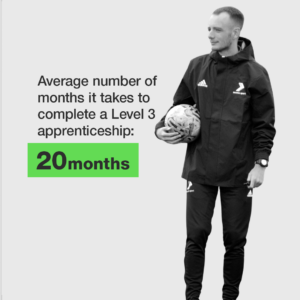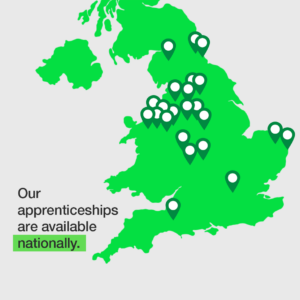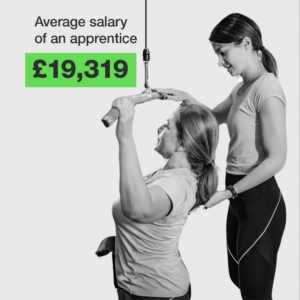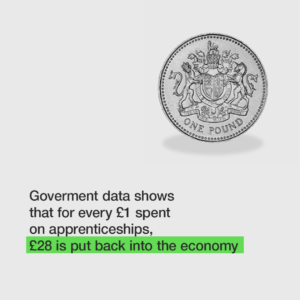
EMPLOY aN apprentice
Whether you want to bring fresh, highly-skilled talent to your business, or upskill your existing staff to match the changing needs of your industry, Access Sport Apprenticeships is here for you.
A thriving business is one that is able to adapt and evolve with the wider industry. With decades of experience in apprenticeships and an offer that takes in a range of apprenticeship standards across a variety of roles within the sport, fitness and leisure industries, we’re ready to help you take your team to the next level.
If you are an employer considering Sport & Leisure apprenticeships or would like to find out more about our apprenticeship offering and how it could support your business then get in touch by booking a consultation with our dedicated team. We have also listed a range of FAQ’s below with match winning information on apprenticeships specific for employers






apprenticeship faq's
An apprenticeship is a paid job which allows you to develop the skills, technical knowledge and experience to help you develop your career.
You will develop your technical knowledge through formal ‘off the job’ training and gain practical skills and experience whilst working. Apprenticeships have been designed by employers and include the knowledge, skills, behaviours and formal qualifications needed for each specific job role and sector.
To be eligible, applicants must be aged 16 or over, living in England and not taking part in full-time education. If they are already employed, they can start an apprenticeship in their current job to help them progress to a higher level position.
Yes, an apprentice can be anyone over the age of 16.
Absolutely, existing employees can do an apprenticeship if they don’t have experience in the subject area or it is a higher level apprenticeship. You can place existing employees on an apprenticeship.
Yes, the apprentice has the same rights and benefits of other employees. They are employed by the employer and paid through the employer’s payroll.
Apprenticeships range from Level 2 to Level 7. The levels and their equivalent qualifications are listed below:
Level 2 = 4 GCSEs
Level 3 = 3 A Levels
Level 4 & 5 = Foundation degree and HNC/D
Level 6 = Bachelor’s Degree
Level 7 = Master’s Degree
Access Industry currently offers apprenticeships up to Level 4, but we continually update available apprenticeships to meet learner needs and industry trends.
If you have fewer than 50 employees and take on an apprentice 16-18, 100% of the training costs will be covered by the ESFA Apprenticeship Reservation Funds.
If you are a non-levy employer, with over 50 employees or an employer with less than 50 employees an your apprentice is 19+ you will have 95% of the training costs covered by the ESFA Apprenticeship Reservation Funds.
If you are a Levy paying employer, the apprenticeship training costs will be covered by your apprenticeship levy
The apprenticeship levy is a form of taxation designed to help companies offer more apprenticeships. It was introduced to benefit businesses by boosting essential training and developing apprenticeship programmes.
The government apprenticeship levy is a tax paid by employers. It is then stored in a fund which can be accessed to help pay for apprenticeship training costs.
It applies to those with a payroll of more than £3 million
It is used to fund apprenticeship training
The levy is charged at 0.5% of an employer’s total payroll
It is collected monthly through PAYE.
If you do not pay into the Apprenticeship Levy, you are able to access up to 100% of the apprenticeship funds from the apprenticeship reservation on your DAS account.
50+ employees with an annual payroll of less than £3 million, you will be able to access 95% of the training costs and you will contribute 5% of the course value, invoiced by Access Industry.
Less than 50 employees, but enrolling an apprentice 19+, you will be able to access 95% of the training costs and you will contribute 5% of the course value, invoiced by Access Industry.
Less than 50 employees and enrolling a learner 16-18, you will be able to access 100% of the training costs from the apprenticeship funding reservations
Levy-paying employers can transfer up to 25% of their Apprenticeship levy payment to multiple Employers, allowing them to use their levy pot more effectively.
Passing on a portion of the levy means companies can help fund training in smaller companies or those in their supply chain that might not have the resources to fund Apprenticeships themselves.
If you want to find a levy transfer to cover the costs of the training, rather than making a reservation, you can view available transfer opportunities on the pledge page. Employers may decide to transfer their levy to specific sectors or businesses. They may also choose to fund particular levels of apprenticeships.
Employers can advertise transfers with four details:
location
sector
type of apprenticeship
apprenticeship level
You can apply for the pledge that matches the levy employer’s needs. This isn’t limited, and you can apply for a pledge even if you don’t match all four advertised details. You can also apply for multiple pledges.
You need an apprenticeship service account to apply for a transfer to fund an apprenticeship for your business.
Before logging into your account and starting the process you need to:
know which apprenticeship standard your apprentices will be undertaking
know how many apprentices you need funding for
know the location of where your apprentice will be working from
know the expected apprentice start date
You can apply for multiple apprentices within one application if they are doing the same apprenticeship. If your apprentices are doing different apprenticeships you need multiple applications.
Once you have applied for a transfer you can see the status of your application in your apprenticeship service account.
Your application is shared directly with the employer. They will review and confirm if they have accepted your application.
If your application is rejected you can apply for another transfer or get funding via reservation.
Once you accept the transferred funds they can only be used to pay for apprenticeship training and assessment, up to the funding band maximum.
Transfer funds can only be used for a new apprenticeship start. They can be a new or existing employee but they cannot have already started an apprenticeship.
Off-the-job training is defined as learning which is undertaken outside of day-to-day work duties and leads towards the achievement of the apprenticeship. This training takes place within the apprentice’s normal (contracted) working hours. The off-the-job training must be directly relevant to the apprenticeship. The minimum off the job training for a full-time apprentice is an average of 6 hours per week. The off-the-job training provides the time to focus and develop the required skills, knowledge and behaviours to achieve the apprenticeship. There are lots of activities that can contribute to off-the-job training. The key thing to remember is that it must be relevant to the apprenticeship.
You can find out more about off-the-job training here.
Reviews take place every 8 – 12 weeks, These tripartite reviews will assess the apprentices progress and discuss their experience in the workplace.
£5.28 is the apprenticeship minimum wage. If your apprentice is 19+ at the point of enrolment, you must increase your apprentice’s salary to minimum wage for their age after 12 months of employment.
If your apprentice starts before the apprenticeship start date, you must pay them National Minimum Wage for their age.
September, November, January and April.
Yes, on request we can introduce you to other employers.
our apprenticeship standards

Level 2
community activator coach
Combines employment and continued study for learners looking to achieve a career in sport or community coaching.

Level 2
LEISURE TEAM
MEMBER
Combines employment and continued study for learners looking to achieve a career in the leisure and fitness industry.

Level 3
COMMUNITY SPORT & HEALTH OFFICER
Combines employment and continued study for learners looking to achieve a career in community sport and health.

Level 4
SPORTS
COACHING
Combines employment and continued study for learners looking to achieve a career in advanced sports coaching.